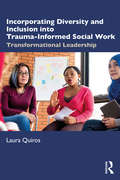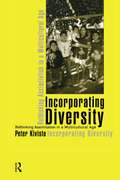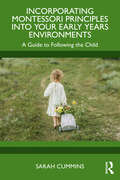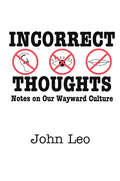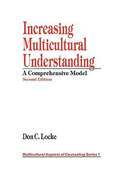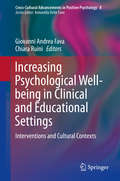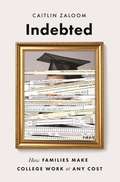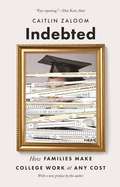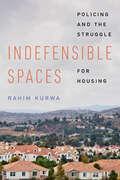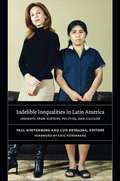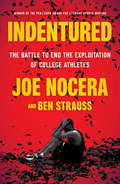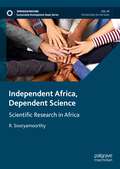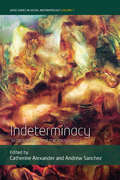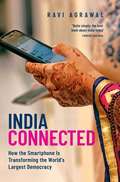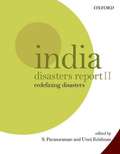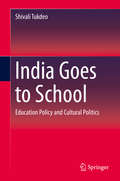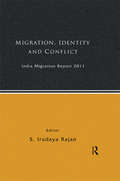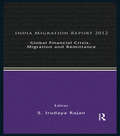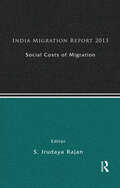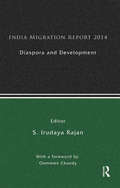- Table View
- List View
Incorporating Diversity and Inclusion into Trauma-Informed Social Work: Transformational Leadership
by Laura QuirosIncorporating Diversity and Inclusion into Trauma-Informed Social Work incorporates discussions of leadership, racism and oppression into a new understanding of how trauma and traumatic experience play out in leadership and organizational cultures. Chapters unpack ideas about the intersections of self, trauma and leadership, bridging the personal and professional, and illustrating the relationship between employees and leaders. Discussion questions and reflections at the end of each chapter offer the opportunity for the reader to understand their own vulnerabilities in relation to the subject matter. This book reconceptualizes cultural competency, trauma and leadership in the context of the 2020 COVID-19 pandemic and views theories and practices through a lens of diversity and inclusivity. Incorporating Diversity and Inclusion into Trauma-Informed Social Work is an expansive guide for students in social work, one that explores and explains how trauma and difference manifest in how we communicate, lead and work with each other.
Incorporating Diversity: Rethinking Assimilation in a Multicultural Age
by Peter KivistoAs the best single-source collection of classic and contemporary readings on the subject, this anthology will be a valuable reference to scholars of immigration, race and ethnicity, national identity, and the history of ideas, and indispensable for courses in history and the social sciences dealing with these topics.' Ruben G. Rumbaut, co-author of Immigrant America: A Portrait and Legacies: The Story of the Immigrant Second Generation Societies today are increasingly characterized by their ethnic, racial, and religious diversity. One key question raised by the global migration of people is how they do or do not come to be incorporated into their new social environments. For over a century, assimilation has been the concept used in explaining the processes of immigrant incorporation into a new society. It has also been applied to indigenous peoples, to refugees, and to involuntary migrants caught up in the slave trade. Assimilation has confronted many scholarly challenges which were often intermeshed with particular political agendas. This book allows readers to obtain a clearer sense of the canonical formulation of assimilation theory and an understanding of the key themes and issues contained in current efforts to rethink and revise the classical perspective for today's changing world.
Incorporating Intersectionality In Social Work Practice, Research, Policy, And Education
by Yvette MurphyThis important book provides guidance for investigating how the social constructions of race, class, gender, age and social orientation intersect with one another, contributing to the oppression of marginalized groups in modern society. Economic and social inequities are mediated by the social locations and lived experiences of people. The intersectionality perspective is often neglected, yet it is vital for understanding social injustice and intervening on behalf of oppressed groups. In Section One, the authors propose a framework for understanding and using intersectionality to conduct research, formulate policies, develop interventions, and disseminate knowledge that improve developmental outcomes and address the economic and social disparities arising from oppression and privilege. The history of intersectionality in social work and its relevance for the professional are discussed in depth in this section. Section Two presents examples of best practices in the use of intersectionality in each of the primary domains of social work-practice, research, policy, and education and concludes with a discussion and recommendations for bringing about a fundamental change in the way social work practitioners and educators think about the profession. Intersectionality constitutes a milestone in social work literature that crystallizes the most valuable aspects of social work theory and practice-its holistic perspective, systems-based approach, and commitment to social justice-into a powerful work that is essential reading for social workers who are interested in mitigating the oppression of marginalized groups and promoting optimal development for all people.
Incorporating Montessori Principles into Your Early Years Environments: A Guide to Following the Child
by Sarah CumminsIncorporating Montessori Principles into Your Early Years Environments will allow readers to understand the developing child in their early years setting and how to adapt a Montessori approach to meet their pupils’ needs. This book shares an insight into Maria Montessori’s extensive research, observations, and findings about child development and education, enabling them to transfer these to their own setting. Based on the scientific observation of the child and the stages of development they go through, Montessori pedagogy can be successfully applied in any setting and is well-known for its child-centred, holistic, and individualised approach to education. By addressing its key principles such as respect for the child, prepared environment, and the role of the adult, chapters highlight the overarching vision Montessori’s approach had and explore how and why it can still be so meaningful in today’s early years classrooms. This book will allow the reader to reflect on the framework they work with and offer examples of adapted practice as well as highlighting the importance of knowing the children, observing their work, and planning suitable resources and activities that will nurture their development. This is an essential reading for trainee Montessori teachers, trainee educators, early childhood professionals, and childminders, empowering them to enhance learning and development for their pupils, whilst instilling love and respect throughout their interactions with them.
Incorporating Texts into Institutional Ethnographies
by Dorothy E. Smith Susan Marie TurnerIn Incorporating Texts into Institutional Ethnographies, Dorothy E. Smith and Susan Marie Turner present a selection of essays highlighting perhaps the single most distinctive feature of the sociological approach known as Institutional Ethnography (IE) - the ethnographic investigation of how texts coordinate and organize people's activities across space and time. The chapters, written by scholars who are relatively new to IE as well as IE veterans, illustrate the wide variety of ways in which IE investigations can be done, as well as the breadth of topics IE has been used to study.Both a collection of examples that can be used in teaching and research project design and an excellent introduction to IE methods and techniques, Incorporating Texts into Institutional Ethnographies is an essential contribution to the subject.
Incorrect Thoughts: Notes on Our Wayward Culture
by John LeoA volume of political essays and social commentary, providing an alternative to the slant of much political journalism. John Leo offers his views of what is going on in law, education, advertising, television, the news media, language and various liberation movements in the USA.
Increasing Multicultural Understanding: A Comprehensive Model
by Don C. LockeLocke's book has become the flagship of the Multicultural Aspects of Counseling series--both as the most popular book in the series and as the first book published in it, reflecting accurately the many goals and dreams we had when the series was conceptualized. In this second edition, Locke has added chapters on the Jewish and the Muslim cultural contexts, with guidelines for counselors working with clients in those cultures. The other 10 chapters have been significantly updated since the 1992 first edition to include some of the extensive publi¬cations that have been written since that time.
Increasing Psychological Well-being in Clinical and Educational Settings
by Giovanni Andrea Fava Chiara RuiniThis volume deals with strategies aimed at increasing psychological well-being in both clinical and non-clinical settings, with a special focus on the impact of cross-cultural influences on these processes. Consisting of two parts, the book first examines clinical interventions for increasing well-being and positive functioning in adult populations. It looks at cultural differences in the experience of psychological well-being, presents an analysis of the concept of psychological well-being and discusses various interventions, including Well-Being Therapy and Cognitive Behavioral Therapy. Other concepts discussed are post-traumatic growth, wisdom and motivation. The second part of the book deals with psychological interventions in childhood and adolescence and has a strong emphasis on educational settings. It provides an overview of the main evidence-based psychotherapies for affective disorders in youths, and looks at the importance and impact of positive education, resilience, and hope. The book presents models for intervention and discusses several therapies in detail.
Increasing Your Influence at Work All-In-One For Dummies
by Dummies PressGet ahead in the workplace by influencing others Influence is a timeless topic for business leaders and others in positions of power, but the world has evolved to the point where everyone needs these skills. No matter your job, role, rank, or function, if you want to get things done you need to know how to influence up, down, across, and outside the organization. Increasing Your Influence at Work All-in-One For Dummies shows you how to contribute more fully to important decisions, resolve conflicts more easily, lead and manage more effectively, and much more. Plus, you'll discover how to develop the most important attributes necessary for influence—trustworthiness, reliability, and assertiveness—and find out how to move beyond. Includes easy-to-apply information for influencing managers, peers, and subordinates Shows you how to build trust with your co-workers and cultivate reliability through consistency and being personal Illustrates how influencing others in the office helps you enjoy a greater measure of control over your work life Helps you advance your career more rapidly than others No matter who you are, where you work, or what your professional goals are, achieving more influence in the workplace is critical for success.
Indebted: How Families Make College Work at Any Cost
by Caitlin ZaloomHow the financial pressures of paying for college affect the lives and well-being of middle-class familiesThe struggle to pay for college is one of the defining features of middle-class life in America today. At kitchen tables all across the country, parents agonize over whether to burden their children with loans or to sacrifice their own financial security by taking out a second mortgage or draining their retirement savings. Indebted takes readers into the homes of middle-class families throughout the nation to reveal the hidden consequences of student debt and the ways that financing college has transformed family life.Caitlin Zaloom gained the confidence of numerous parents and their college-age children, who talked candidly with her about stressful and intensely personal financial matters that are usually kept private. In this remarkable book, Zaloom describes the profound moral conflicts for parents as they try to honor what they see as their highest parental duty—providing their children with opportunity—and shows how parents and students alike are forced to take on enormous debts and gamble on an investment that might not pay off. What emerges is a troubling portrait of an American middle class fettered by the "student finance complex"—the bewildering labyrinth of government-sponsored institutions, profit-seeking firms, and university offices that collect information on household earnings and assets, assess family needs, and decide who is eligible for aid and who is not.Superbly written and unflinchingly honest, Indebted breaks through the culture of silence surrounding the student debt crisis, revealing the unspoken costs of sending our kids to college.
Indebted: How Families Make College Work at Any Cost
by Caitlin ZaloomHow the financial pressures of paying for college affect the lives and well-being of middle-class familiesThe struggle to pay for college is a defining feature of middle-class life in America. Caitlin Zaloom takes readers into homes of families throughout the nation to reveal the hidden consequences of student debt and the ways that financing college has transformed our most sacred relationships. She describes the profound moral conflicts for parents as they try to honor what they see as their highest parental duty—providing their children with opportunity—and shows how parents and students alike are forced to gamble on an investment that might not pay off. Superbly written and unflinchingly honest, Indebted breaks through the culture of silence surrounding the student debt crisis, exposing the unspoken costs of sending our kids to college.
Indefensible Space: The Architecture of the National Insecurity State
by Edited by MICHAEL SORKINShowing how the upswell of paranoia and growing demand for security in the post-9/11 world has paradoxically created widespread insecurity, these varied essays examine how this anxiety-laden mindset erodes spaces both architectural and personal, encroaching on all aspects of everyday life. Starting from the most literal level—barricades and barriers in front of buildings, beefed up border patrols, gated communities, "safe rooms,"—to more abstract levels—enhanced surveillance at public spaces such as airports, increasing worries about contagion, the psychological predilection for fortified space—the contributors cover the full gamut of securitized public life that is defining the zeitgeist of twenty-first century America
Indefensible Spaces: Policing and the Struggle for Housing
by Rahim KurwaA free ebook version of this title is available through Luminos, University of California Press’s Open Access publishing program. Visit www.luminosoa.org to learn more.Indefensible Spaces examines the policing of housing through the story of Black community building in the Antelope Valley, Los Angeles County's northernmost outpost. Tracing its evolution from a segregated postwar suburb to a destination for those priced, policed, and evicted out of Los Angeles, Rahim Kurwa tells the story of how the Antelope Valley resisted Black migration through the policing of subsidized housing—and how Black tenants and organizers fought back. This book sheds light on how the nation's policing and housing crises intersect, offering powerful lessons for achieving housing justice across the country.
Indelible Inequalities in Latin America: Insights from History, Politics, and Culture
by Paul Gootenberg Luis ReygadasSince the earliest years of European colonialism, Latin America has been a region of seemingly intractable inequalities, marked by a stark divide between the haves and the have-nots. This collection illuminates the diverse processes that have combined to produce and reproduce inequalities in Latin America, as well as some of the implications of those processes for North Americans. Anthropologists, cultural critics, historians, and political scientists from North and South America offer new and varied perspectives, building on the sociologist Charles Tilly's relational framework for understanding enduring inequalities. While one essay is a broad yet nuanced analysis of Latin American inequality and its persistence, another is a fine-grained ethnographic view of everyday life and aspirations among shantytown residents living on the outskirts of Lima. Other essays address topics such as the initial bifurcation of Peru's healthcare system into one for urban workers and another for the rural poor, the asymmetrical distribution of political information in Brazil, and an evolving Cuban "aesthetics of inequality," which incorporates hip-hop and other transnational cultural currents. Exploring the dilemmas of Latin American inequalities as they are playing out in the United States, a contributor looks at new immigrant Mexican farmworkers in upstate New York to show how undocumented workers become a vulnerable rural underclass. Taken together, the essays extend social inequality critiques in important new directions. Contributors Jeanine Anderson Javier Auyero Odette Casamayor Christina Ewig Paul Gootenberg Margaret Gray Eric Hershberg Lucio Renno Luis Reygadas
Indentured
by Joe Nocera Ben Strauss"How can the NCAA blithely wreck careers without regard to due process or common fairness? How can it act so ruthlessly to enforce rules that are so petty? Why won't anybody stand up to these outrageous violations of American values and American justice?" In the four years since Joe Nocera asked those questions in a controversial New York Times column, the National Collegiate Athletic Association has come under fire. Fans have begun to realize that the athletes involved in the two biggest college sports, men's basketball and football, are little more than indentured servants. Millions of teenagers accept scholarships to chase their dreams of fame and fortune--at the price of absolute submission to the whims of an organization that puts their interests dead last. For about 5 percent of top-division players, college ends with a golden ticket to the NFL or the NBA. But what about the overwhelming majority who never turn pro? They don't earn a dime from the estimated $13 billion generated annually by college sports--an ocean of cash that enriches schools, conferences, coaches, TV networks, and apparel companies . . . everyone except those who give their blood and sweat to entertain the fans. Indentured tells the dramatic story of a loose-knit group of rebels who decided to fight the hypocrisy of the NCAA, which blathers endlessly about the purity of its "student-athletes" while exploiting many of them: The ones who get injured and drop out because their scholarships have been revoked. The ones who will neither graduate nor go pro. The ones who live in terror of accidentally violating some obscure rule in the four-hundred-page NCAA rulebook. Joe Nocera and Ben Strauss take us into the inner circle of the NCAA's fiercest enemies. You'll meet, among others . . . ·Sonny Vaccaro, the charismatic sports marketer who convinced Nike to sign Michael Jordan. Disgusted by how the NCAA treated athletes, Vaccaro used his intimate knowledge of its secrets to blow the whistle in a major legal case.·Ed O'Bannon, the former UCLA basketball star who realized, years after leaving college, that the NCAA was profiting from a video game using his image. His lawsuit led to an unprecedented antitrust ruling.·Ramogi Huma, the founder of the National College Players Association, who dared to think that college players should have the same collective bargaining rights as other Americans.·Andy Schwarz, the controversial economist who looked behind the façade of the NCAA and saw it for what it is: a cartel that violates our core values of free enterprise. Indentured reveals how these and other renegades, working sometimes in concert and sometimes alone, are fighting for justice in the bare-knuckles world of college sports.From the Hardcover edition.
Independent Africa, Dependent Science: Scientific Research in Africa (Sustainable Development Goals Series)
by R. SooryamoorthyThis book offers an examination of Africa’s scientific landscape based on extensive empirical data encompassing fifty-four African countries. It traces the evolution of science on the continent, highlighting research areas, global partnerships, funding sources, research capacity, and the impact of science policies. Acknowledging that Africa relies heavily on external sources, particularly from the Global North, for scientific research, the book identifies and addresses obstacles hindering self-reliance and underscores the urgent need for revitalized partnerships and cooperation to bolster Africa's scientific autonomy. It offers valuable recommendations to promote self-reliance, making it an indispensable resource for scholars, policymakers, and practitioners.
Indeterminacy: Waste, Value, and the Imagination (WYSE Series in Social Anthropology #7)
by Catherine Alexander Andrew SanchezWhat happens to people, places and objects that do not fit the ordering regimes and progressive narratives of modernity? Conventional understandings imply that progress leaves such things behind, and excludes them as though they were valueless waste. This volume uses the concept of indeterminacy to explore how conditions of exclusion and abandonment may give rise to new values, as well as to states of despair and alienation. Drawing upon ethnographic research about a wide variety of contexts, the chapters here explore how indeterminacy is created and experienced in relationship to projects of classification and progress.
India Calling: An Intimate Portrait Of A Nation's Remaking
by Anand GiridharadasAnand Giridharadas sensed something was afoot as his plane from America prepared to land in Bombay. An elderly passenger looked at him and said, "We're all trying to go that way," pointing to the rear. "You, you're going this way?"Giridharadas was returning to the land of his ancestors, amid an unlikely economic boom. But he was more interested in its cultural upheaval, as a new generation has sought to reconcile old traditions and customs with new ambitions and dreams. In India Calling, he brings to life the people and the dilemmas of India today, through the prism of his émigré family history and his childhood memories of India. He introduces us to entrepreneurs, radicals, industrialists, and religious seekers, but, most of all, to Indian families. Through their stories, and his own, he paints an intimate portrait of a country becoming modern while striving to remain itself.
India Connected: How the Smartphone is Transforming the World's Largest Democracy
by Ravi AgrawalIndia is connecting at a dizzying pace. In 2000, roughly 20 million Indians had access to the internet. In 2017, 465 million were online, with three new people logging on for the first time every second. By 2020, the country's online community is projected to exceed 700 million; more than a billion Indians are expected to be online by 2025. While users in Western countries progressed steadily over the years from dial-up connections on PCs, to broadband access, wireless, and now 4G data on phones, in India most have leapfrogged straight into the digital world with smartphones and affordable data plans. What effect is all this having on the ancient and traditionally rural culture dominated by family and local customs? Ravi Agrawal's book explores that very question, seeking out the nexuses of change and those swept up in them. Smartphones now influence arranged marriages, create an extension of one's social identity that moves beyond caste, bring within reach educational opportunities undreamed of a generation ago, bridge linguistic gaps, provide outlets and opportunities for start-ups, and are helping to move the entire Indian economy from cash- to credit-based. The effects are everywhere, and they are transformative. While they offer immediate access to so much for so many, smartphones are creating no Utopia in a culture still struggling with poverty, illiteracy, corruption, gender inequality, and income disparity. Internet access has provided greater opportunities to women and altered how India's outcasts interact with the world; it has also made pornography readily available and provided an echo chamber for rumor and prejudice. Under a government determined to control content, it has created tensions. And in a climate of hypernationalism, it has fomented violence and even terrorism. The influence of smartphones on the world's largest democracy is pervasive and irreversible, disruptive and creative, unsettling and compelling. Agrawal's fascinating book gives us the people and places reflecting what the internet hath wrought. India Connected reveals both its staggering dimensions and implications, illuminating how it is affecting the progress of progress itself.
India Disasters Report II: Redefining Disasters
by S. Parasuraman Unni KrishnanIndia Disasters Report II highlights the reality of disaster vulnerability in India due to natural causes and developmental interventions. It emphasizes the need to look at disasters as an outcome of processes rather than stand-alone events. Adopting a multidisciplinary approach, this Report emphasizes the importance of understanding the causes, effects, and complex dynamics of disasters. It asserts the need to link natural systems, social systems, and technological limitations to devise policies and action plans for disaster prevention, relief operations, and environmentally-inclusive development. With climate change becoming a global concern, India now has laws and policies, national, state, and district level administrative set-ups, and humanitarian initiatives in place for disaster preparedness and response measures. Exploring diverse issues such as vulnerability, development, environment, gender, health, and information, communication, and technology, in disasters, this Report discusses recent disasters in India and how new thinking affects policy initiatives and actual practice in disaster management.
India Goes to School: Education Policy and Cultural Politics
by Shivali TukdeoThis book pays attention to education in India as part of several overlapping stories developed along different axes: stories of dissent, contestations, appropriation and social action. . It historicizes the enterprise of formal education by paying attention to the numerous policy shifts. Further, it theorizes the education policy discourse by analysing the ways in which education is increasingly being shaped by international/transnational knowledge production, actors and norms. Focusing on the cultural politics of education policy production, circulation and translation across different contexts, the book revisits some of the long-standing and unresolved debates on social reforms, justice, nationalism and mobility. Evolution of ideas such as mass education, national education, adult literacy and education through public-private-partnerships showcase the momentous shifts in education policy over the course of last century. Ideas, institutional and economic arrangements, administrative formulations and frameworks for implementation make frequent appearances in the cultural as well as political reading of education policy. In a departure from the traditional policy research, this work sees policy as socially and culturally constructed; connected to questions of power, context and struggle; and part of a number of processes at large.
India Migration Report 2011: Migration, Identity and Conflict (India Migration Report)
by S. Irudaya RajanThis book examines identities, violence and conflict in the context of internal migration within India. As India prepares to count its citizens for Census 2011 with a proposal for a National Population Register and a unique identity card for every Indian citizen, the debate on internal and cross-border migration is significant. The second volume in this annual series, India Migration Report 2011 focuses on the implications of internal migration, livelihood strategies, recruitment processes, and development and policy concerns in critically reviewing the existing institutional framework. The essays provide a district-level analysis of the various facets of migration with a focus on employment networks, gender dimensions and migration–development linkages, with concrete policy suggestions to improve living and working conditions of vulnerable migrant workers who are a lifeline to the growth of Indian economy. This will be an invaluable resource for those in the fields of demography, economics, sociology, public policy and administration.
India Migration Report 2012: Global Financial Crisis, Migration and Remittances (India Migration Report)
by S. Irudaya RajanThis volume is a collection of articles dealing with various dimensions of the Global Financial Crisis and its economic and social impact in terms of governance, emigration, remittances, return migration and re-integration. The crisis, which had its origin in the United States in 2008, spread its economic effects on developed as well as developing countries. Some of these countries were able to recover in the short run while some are in the process of recovery, with continuous efforts by both national governments and international agencies. In this backdrop, is there any impact on the outflow of emigrants from the countries of origin and inflow of remittances to the countries of destination? The third volume in the annual series ‘India Migration Report’ answers the question through rigorous quantitative and qualitative analyses and fieldwork both in the Gulf region and South Asia, and concludes that both emigration and remittances are more resilient than expected. This report: contains findings based on an extensive survey conducted in Kerala; has additional evaluations based on other surveys and case studies conducted in different parts of India, Pakistan, Bangladesh, Nepal and Sri Lanka to reflect on the consequences of the global crisis on the countries of origin, as well as a quick assessment and site visits to the United Arab Emirates, Kuwait, Qatar and Malaysia; includes essays that examine the linkages between emigration and remittances based on international data from the World Bank, the International Labour Organization, the International Organization of Migration, the United Nations and other organizations that closely deal with international migration. It will be of interest to students and scholars of migration studies, sociology, law, economics, gender studies, diaspora studies, international relations and demography, apart from non-governmental organizations, policy-makers and government institutions working in the field of migration.
India Migration Report 2013: Social Costs of Migration
by S. Irudaya RajanThis volume is an empirical assessment of an often-neglected space in migration research — social, psychological and human costs for both migrants and the families they leave behind — based on qualitative and quantitative research findings. Globally, the focus of migration research has consisted of the intersections of migration and remittances. This overemphasis on remittances obscures the contributions and sacrifices made by migrants and their families. With this backdrop in view, India Migration Report 2013 documents issues such as: • Children’s negotiation of parental migration • Coping mechanisms adopted by women left behind • Utilization of social networks by the elderly during a health crisis • Demographic implications of migration • Household management and child care by spouses of migrant nurses • Lifestyle management by the elderly, who migrate with their children, in the absence of other traditional and familiar kinship structures • Transition costs involved in peasant migration • Social costs of migration in the case of emigration to the Gulf region • Broader impacts of migration on the family In addition, the book also includes articles dealing with nurses’ migration, skilled mobility, informalization of labour markets, mobility of women workers, global financial crisis and return migration, remittances management and a critical assessment of bilateral mobility agreements among nations to protect Indian workers. It will be of interest to those in migration studies, sociology, law, economics, gender studies, diaspora studies, international relations and demography, apart from non-governmental organizations, policy-makers and governmental institutions working in the field of migration.
India Migration Report 2014: Diaspora and Development (India Migration Report)
by S. Irudaya RajanIndia Migration Report 2014 is one of the first systematic studies on contribution of diasporas in development, in countries of origin as well as destination. This volume: examines how diasporic human and financial resources can be utilized for economic growth and sustainable development, especially in education and health; offers critical insights on migrant experiences, transnationalism and philanthropic networks, and indigenization and diaspora policies, as well as return of diasporas; and includes case studies on Indian migrants in the Gulf region — in particular, Bahrain, Oman and Saudi Arabia — and the United Kingdom, among others. With essays by major contributors, the volume will interest scholars and researchers on economics, development studies, migration and diaspora studies, and sociology. It will also be useful to policy-makers and government institutions working in the area.
